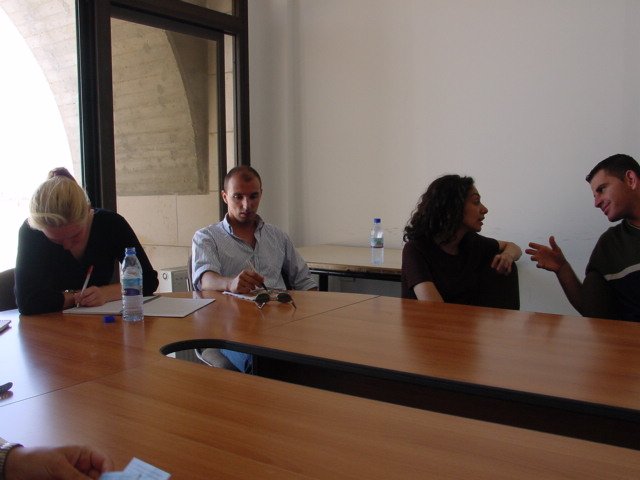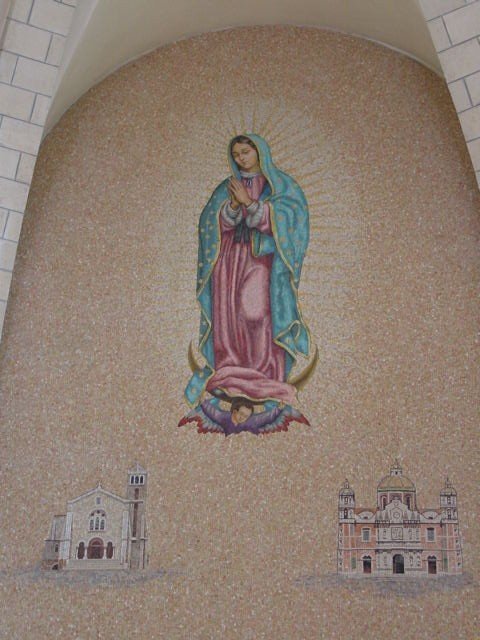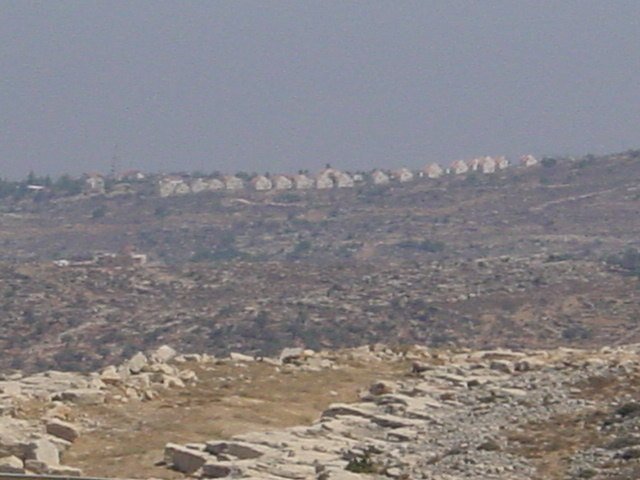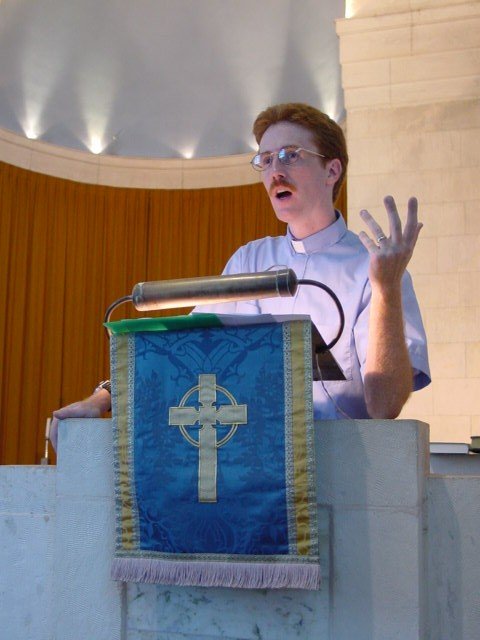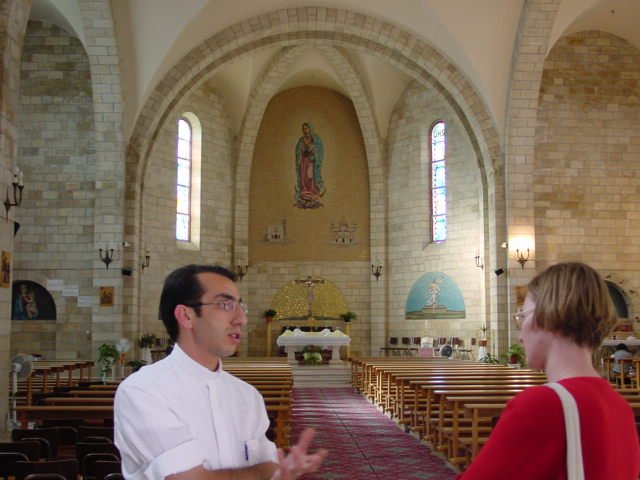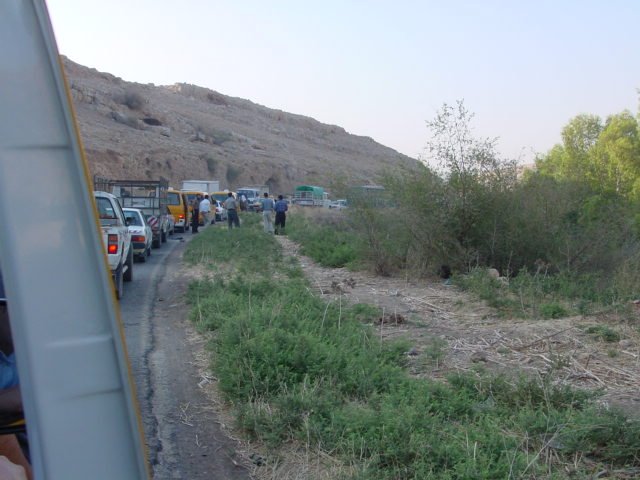July, 2001
No one in the Palestinian human rights camp seems to be ignoring PA violations, as can be seen in their very thick year 2000 annual report. However, the human rights problems with the PA have clearly taken a back seat as the PICCR is fighting to keep up with the overwhelming number and scope of infractions of the current Israeli seige.
Coming home, there was an Israeli jeep between the two roadblocks, with soldiers shining bright lights on all of us who were walking across
In 1987, during the first Intifada, the entire camp was surrounded by a twenty foot concrete and barbed wire wall, and all of its entrances were closed off. There was one opening, a grilled revolving door gate, manned by the Israeli army. The gate remains a memorial to those years, and to the hope that they can return to their villages.
There was particularly creepy article in the Jerusalem Post today, the city's right-wing voice box (this in addition to the front page, where a photo of graffiti saying "Death to All Arabs" was accompanied by the headline: "A Time for Vengeance?"). An editorial was commenting on press coverage of the siege and violence here, saying it was typical anti-Semitic bias. They gave some specific examples, but said the winner of the "Black Boot Award" (a not-so-subtle reference to Nazism) went to the reporter for the UK Guardian. The final line said, "Congratulations on winning the award. And we're looking forward to delivering it to you in person."
There's something refreshing about a chain-smoking Palestinian feminist who has great affection for Quakers.
Hamas (which claimed responsibility for the Dolphinarium Disco bombing in Tel Aviv among other things) sprang out of the ruins of the Muslim Brotherhood in the 1980s. Our professor said that they were strengthened by the PLO's loss of influence (particularly after Israel's attacks on Lebanon, where the PLO was in exile) and by an intentional choice of the Israeli government to allow their growth (i.e. not suppress their political actions and pursue their leaders as they were doing with the PLO) in an attempt to nurture discord in Palestinian resistance.
Across the road, we could see the continued construction of Har Homa, the Israeli settlement on the Arab land of Jabal Abu-Ghneim, once a thickly forested hill, renowned for the beauty and respite it offered to the Bethlehem area.
Abuna (Father) Iyad made a point of introducing us to the community and welcoming us in their midst. The community was most warm, and we stayed after to chat for quite a while.
Today was a day for nerding out. We haven't had much of a chance recently to really dig into our studies, so a day without anything to do was most welcome.
The normal roads, like most of the West Bank, have either been closed to Palestinians (either by roadblocks or military vehicles) or are too dangerous for them (with settler groups "keeping watch" over "their" roads). Nevertheless, we had to go through an Israeli checkpoint. They stopped our van, picked out one of the two Palestinians in our van, and scrutinized his ID - the look on that Israeli soldier's face was nothing if not pure revulsion and hatred, and gave us all pause.
The violence of the Israeli Occupation is increasing, as is the Palestinian response to that Occupation. Non-violent resistance continues to be used as a strategy to fight the Occupation (consider the daily acts of resistance performed by thousands of people: crossing road blocks to go to work and school, using tractors to open closed roads, refusing to buy Israeli goods, requesting international monitors to observe/protect them, organizing protest marches and events, etc.).
This is the second week of the Latin Church's camp. About 200 kids come each day to play games, do art projects, see films, study the Bible, and of course prepare songs and dances.
As far as Israel is concerned, his Palestinian identity overrides his American citizenship. The American Consulate told him it's none of their business - this is an internal Israeli issue.
We've talked to Gaza students who have not been able to make the short trip home for over two years.
One woman asked if the village we lived in would be considered in Samaria. The tour guide, who knows the West Bank quite well said, "yes." "It was in Biblical times," we added. "Samaria" has become a politically-loaded term, often used by Israelis who are staking claim to the northern West Bank as part of the state of Israel (e.g. the Ministry in charge of settlements is called the Council of Judea and Samaria). Indeed, for a period in history, the region around Zababdeh was a primarily Jewish place called Samaria; but this is not the only, or necessarily the most dominant or identifying period in its history. In a way, to refer to it as Samaria denies the reality of the current inhabitants and situation; it overlooks the people and history before and after that particular Biblical period.
We caught a ride to Ramallah with one of the students in our class, a Belgian who is married to a Palestinian. They have two kids and are living in Ramallah for the foreseeable future, but has to renew her tourist visa every three months (there is no permanent resident status granted to non-Jewish foreigners in the Occupied Territories, even if they have family obligations there).
He talked about Birzeit's "illegal cells of education" (so-called by the Israeli government) as it organized classes in professors' homes between 1988 and 1992 when the University was closed by Israeli military order.
We negotiated the "road" for another hour before joining back up with the road on the other side of the checkpoint. "Welcome to the occupation," once sang REM's Michael Stipe.
While we were gone, our telephone bill went unpaid for three weeks, which meant that it got cut.
We got the chance to visit and catch up with our Zababdeh friends and neighbors, who were anxious to hear stories about our time in the States and word from our families.
It was a little hard to feel like celebrating, anyway - word came of an assassination of three Palestinians in their car near Zababdeh (Marthame heard about it from one of his 8th grade students by email), most likely with American-made weaponry. The sad irony of Independence Day...
Our speaker was an eloquent expert on Palestinian humor and folklore. He gave an insightful talk on the subject, citing jokes and folktales as much better judges of public opinion and morale than political speeches - they circulate if they resonate with the people, and they die if they do not.
Unfortunately, our travels for the day are not over. We took a while trying to figure out how we were going to get to Birzeit - one word was that the checkpoint was closed, another was that it was open but yellow-plated taxis would not be allowed in.







